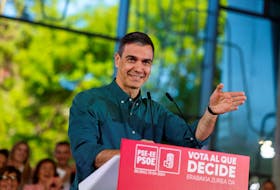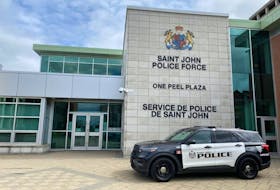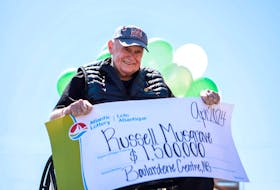Two Dalhousie University philosophers are among 17 academics who have joined a legal battle to help a pair of chimpanzees in New York state gain a status of personhood.
Andrew Fenton and Letitia Meynell, together with a group of colleagues from universities across the U.S., penned an amicus brief to point out inconsistencies in how the courts perceive animals like the great apes.
The case deals with Kiko and Tommy, two male chimpanzees being held by their respective owners without contact with other chimpanzees. Tommy is owned by Diane and Patrick Labery in Gloversville, N.Y. Kiko is in Niagara Falls, N.Y., with owners Carmen and Christie Presti.
Members of the Nonhuman Rights Project, an international advocacy group for the rights of apes, elephants, whales and dolphins, have been trying since 2013 to get Kiko and Tommy released to a chimpanzee sanctuary in Florida.
“Unfortunately, animal welfare laws are such that the folks that own them and held them alone are not breaking any … laws,” Fenton says.
“The thing that the Nonhuman Rights Project were thinking would be most effective would be using the common law instrument of habeas corpus to argue that they are being unlawfully detained or confined and have them released, albeit to an adequate chimpanzee sanctuary.”
Kevin Schneider, executive director of the Nonhuman Rights Project, says the process has involved multiple lawsuits, first launched in upstate New York. Those first suits and subsequent appeals were denied.
The organization then launched new suits on behalf of Kiko and Tommy in Manhattan. They were again denied. Currently they are waiting on a decision on a motion for permission to appeal, with the help of the philosophers’ brief.
Philosophy to the rescue (maybe)
“We’ve had that before them for a month and a half,” Schneider said from New York on Monday. “Really, any day now, we could get a ruling telling us either we get an appeal, here are your dates, turn in a brief, or they’ll deny us again.”
There’s already a plan in place for that possibility.
The problem is only persons have the right to habeas corpus, the right against unlawful confinement. In seeing the courts’ reasons for denial of the suits, Fenton feels they could use the logical help of the academics.
“We thought as a group of philosophers we could critically engage with the rulings that were coming through the … court system and point out where we thought there were inadequacies in the way they were thinking about their conceptions of personhood, and then offer some philosphical corrections from our expertise as philosophers.”
The amicus brief, literally a “friend of the court” brief, is a way of helping a court think through complex issues.
Fenton says the court’s concepts of species identity, human community, and being able to engage in a social community are inadequate from a philosophical point of view.
The court is limited in options, he says. Something is either a thing or a person under law.
“We object to chimpanzees being regarded as things and being treated as things,” Fenton sys. “We know enough now in contemporary primatology — and have known enough in primatology since at least the late ’70s and early ’80s — that these are complex social beings. They live in complex social environments. In ways that matter, they seem to be self-aware.
“So if they’re not best regarded as things under law and your only two options are you’re either a thing or you’re a person, then we think they’re better regarded as persons under our current framework.”
Maybe a third concept could be developed in the future but a binary choice is pretty much all there is now.
Not human, but deserving of rights
For fellow Dal philosopher Meynell, it seems obvious that Kiko and Tommy, formerly used in the entertainment industry, are being harmed in a manifestly unjust way.
“The idea that they are things and should have no rights whatsoever and can be appropriately and legally left in circumstances where they have no lives — they’re alive but without a life — is just preposterous,” she says. “It kind of stands out as a gross injustice.”
What the Nonhuman Rights Project is trying to do is to push the law to recognize that some nonhuman animals are the kinds of beings who should have rights that are respected under the law, she says.
“There’s a failure to really think through the way we individually and as a society live with other animals, which I think is starting to become a topic where people are really trying to do better, which is great,” Meynell says.
The group found Kiko and Tommy by “basically good, old-fashioned detective work,” Schneider says, adding it’s not as easy as one might think to find people who keep their own chimpanzees.
“You’d be surprised how easy it is to hide one of them because at the end of the day, they’re property,” he says.
Schneider stresses that they don’t allege that the two apes are being physically abused or mistreated.
“(But) the law is perfectly OK with Tommy, Kiko and any other individual like them being what held in what amounts to solitary confinement.”

Tommy’s plight has been featured in a documentary film Unlocking the Cage, which the group offers on its website.
“And look, no one’s saying ‘they’re abusing him, they’re whaling on him,’ but if you take a step back and you take stock of what we now know of these beings from Jane Goodall’s time on down, the last 40 years of really transformative research, we can now, we argue, look at that and say this is just wrong.”
Schneider says the philosophers’ amicus brief may serve to get the New York Court of Appeals to stop and say that this is a question that keeps coming up and is obviously of some importance.
“We think that they need a lot of help when it comes to this and that’s exactly what a brief like this is meant to do.”
In the eyes of the law, a corporation can be a legal person, Schneider points out. So can non-profits. Throughout history women have had to establish their personhood. The same with Indigenous people, children and slaves, he says.
“For almost all of its history, it’s been used as a cultural tool to oppress.
“We’re pushing for a start because we believe it has to start.”









